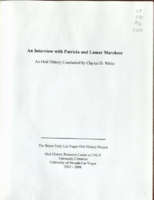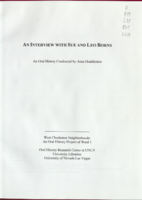Search the Special Collections and Archives Portal
Search Results

Transcript of interview with Jackie MacFarlane by Claytee White, February 4, 2010
Date
Archival Collection
Description
Jacqueline "Jackie" Tilman MacFarlane was born in her grandmother's Las Vegas home at H Street and Clark Ave. Her father John Franklin Tilman was a construction worker at Boulder Dam (now Hoover) in early 1930s. Jackie recalls her family having to move several times the Great Depression and living in rural Nevada. Eventually the family came back to reside in Las Vegas. After graduating from high school, she took a waitress job at the Spot Cafe (Main & Charleston) and then at the Askew Drive-In. It was there that she met her future husband, David MacFarlane, an Air Force cadet. David continued to work at Nellis Air force Base as a civilian until he retired in 1987. Jackie describes raising her children in Fair Circle neighborhood during the 1950s and 1960s; a time when Las Vegas was just a "small town of 50,000." She felt safe and always found work in the casinos. Her work career included being a change girl at the Mint of Fremont St. and working as the front office cashier at the Desert Inn and then working at the Sands Hotel and Casino. Eventually she became a night auditor at Sands Hotel and Casino and then at Sahara Hotel and Casino from 1970-1977. She remembers working nightshift, coming home to get the kids and husband off to school and work. After leaving Sahara, she began selling Vanda cosmetics as a home business, something she still does today.
Text

Transcript of interview with Pat and Lamar Marchese by Claytee White, January 16, 2008
Date
Archival Collection
Description
Pat Marchese grew up in Johnston, Pennsylvania, and Lamar was reared in Tampa, Florida. Pat was raised on a farm surrounded by relatives. Lamar takes pride in his mother heritage, which can be traced to Tampa Bay, Florida, in the early 1840's. Pat and Lamar graduated from the University of South Florida and relocated to Las Vegas in 1972. Pat's remarkable 30-plus year passion includes working for the city of Las Vegas and Clark County, Nevada. She created numerous art and cultural programs which consist of the Civic Symphony, Charleston Heights Arts Center, Rainbow Company Theatre, along with consulting work for the Allied Arts Council. In addition, to her creating art and cultural agendas, she became a budget analyst and chief lobbyists for the county, testifying before the Senate Taxation Committee. She implemented through the public arts program, a Mural Arts Series, the Parks and Recreation Cultural Division, and culture on the Strip. Pat executed the grant that ensured the necessary funding for the expansion for public broadcasting radio stations throughout California, Utah, Arizona and Nevada. She's certainly worthy of her title "Queen of Las Vegas Culture". Lamar's amazing 30-plus year's calling comprises putting into action an abundant number of libraries programs for the State of Nevada along with establishing the first public broadcast radio station in Nevada. His library accomplishments include merging the City's libraries branches, library programs, shows, concerts, unification of academic libraries and public libraries and the first reciprocal borrowing agreement for the State of Nevada with the Nevada library card. He consolidated Las Vegas Libraries and the Las Vegas Clark County Library District. He also sold bonds for the development of future libraries. Lamar's broadcasting achievements consist of incorporating the Nevada Public Radio Corporation with State of Nevada, serving as Chairman of the board for NPRC, constructing broadcasting translators and radio stations throughout the tri-state and enveloping the State of Nevada through public broadcasting. Combined, Pat and Lamar Marchese have served the Las Vegas community for over six decades. Thanks to the Marcheses, broadcasting is thriving throughout the tri-state area, libraries are blossoming and cultural programs are flourishing. They are looking forward to retiring, traveling, spending time with loved ones, and most of all, Pat and Lamar time together.
Text

Transcript of interview with Leo Borns and Sue Easley Borns by Anna Huddleston, March 21, 2014
Date
Archival Collection
Description
Leo and Sue (Easley) Borns came to Las Vegas in 1962 to begin an architectural career that would last forty-four years in Southern Nevada. Leo Boms worked for various firms in Las Vegas before developing a reputation as "F. Borns, Architect". He has gone on to design buildings for state public works, Clark County, the City of Las Vegas, Clark County School District, churches, and private home owners. Rarely taking a job outside of Southern Nevada, Leo Boms' intent was to develop an architecture considered indigenous to the area while keeping the conservation of energy and technology as prime importance. Mr. and Mrs. Boms, after living in the area for approximately five years, decided to purchase a home on Strong Drive in McNeil Estates where they raised their three children. Active in social and philanthropic organizations, both Leo and Sue have become acquainted with numerous area personalities. Mr. Boms is most proud of being a part of the development of the Kiwanis Water Conservation Park although his structural designs can be seen throughout the Southern Nevada area. At the age of 77, he closed his office but remains an integral influence on the Greater Las Vegas area.
Text

Transcript of interview with Don Ross by Barbara Tabach, February 15, 2017
Date
Archival Collection
Description
At the time of this interview, Don Ross has devoted nearly four inspirational decades of his life in the hotel and hospitality industry. In December 1987, at the age of 29, he accepted a position with Caesars and is now the Vice President of Catering, Conventions & Events for Caesars Palace Las Vegas. Don shares personal stories that lead to his “Don-mode” of providing a high level of customer service. From experiences with his grandparents to an extraordinary upbringing in his parents’ business, Green Chimneys, in Brewster, New York, Don received a surprisingly well-rounded educational foundation. As Don discovered his natural innate ability to serve others in the hospitality industry, he thrived and has never looked back. In recent years, his leadership talents and giving nature have been honored. In 2009, he was one of three distinguished industry executives recognized for their exceptional contributions to the hospitality industry as an “Industry Executive of the Year” during UNLV Harrah College of Hotel Administration’s 5th Annual Vallen Dinner of Distinction. Over the years, he has been honored for his work with Opportunity Village, his Jewish community involvement, and his continued work with Green Chimneys among many other organizations and causes.
Text

Transcript of interview with Hazel Hedges by Irene Rostine, October 29, 1997
Date
Archival Collection
Description
Interviewed by Irene Rostine. Hazel Hedges moved from Kansas City to Las Vegas with her husband and son in 1952. She worked briefly as a waitress in the dining room at the Thunderbird and then became a stay at home mom until her son was in junior high. Then after she went to real estate school, she went to work in commercial real estate at Bond Realty. After that, she passed her brokers exam and transferred to Parkway Realty where she sold land. Her primary success in real estate came from selling houses and investing in land and residential properties personally. After leaving Parkway Realty, Hazel went to work for the real estate office Deshoor, Fair, and Davis, which she eventually bought and renamed Southside Realty. Eventually her son joined her, and they operated Hedges and Wade Realty with two offices, one on each side of town. Hazel also did volunteer work including the Assistance League Las Vegas' Operation School Bell Program, which provides clothing for area school children in need.
Text

Transcript of interview with Jack Herst by Suzan DiFederico, March 1, 1976
Date
Archival Collection
Description
On March 1st, 1976, Suzan DiFederico interviewed Jack Herst (born in 1943 in Las Vegas, Nevada) in his home on 3221 La Mirada Street, Las Vegas, Nevada. During the interview, DiFederico does not speak; rather, Herst appears to read and answer questions aloud from “DiFederico’s dossier.” Herst talks about the population growth in Nevada and emphasizes the significant changes Las Vegas has experienced from its origins as a small town. Herst also discusses his personal family history, his Jewish identity and community affiliations, as well as his employment history as a dealer and broker at different casinos.
Text

Transcript of interview with Dan Hill by John Bennett, March 1, 1979
Date
Archival Collection
Description
On March 1, 1979, John L. Bennett interviewed Dan Hill (born May 20, 1914 in Illinois) in his home at 2130 Walnut Road, Las Vegas, Nevada, about his memory of Southern Nevada. In addition to the collector and informant, there is an unidentified woman present during the interview. Hill explains that he originally came to Nevada in search of work. He briefly moved to Europe during the First World War where he served in the Army; at the end of the war, Hill returns to Las Vegas to work at the Nevada Test Site. Hill then goes in-depth about his experience as a worker at the Nevada Test Site and different mining sites that he had also worked at. The two briefly discuss the different sheriffs that had been in charge of Las Vegas, and how many people came to Las Vegas to work at the Henderson Magnesium Plant and Hoover Dam in addition to the Nevada Test Site.
Text

Transcript from interview with Rabbi Yocheved Mintz by Barbara Tabach, March 11, 2015
Date
Archival Collection
Description
During this oral history, Rabbi Yocheved Mintz weaves the journey of her life before and during her move to Las Vegas. She recalls thinking the "whole world was Jewish" growing up in Cleveland, Ohio, and discusses finding a community in Las Vegas, and becoming a rabbi in 2004.
Yocheved (nee Porath) Mintz is a native of Cleveland, Ohio, where she grew up surrounded by Jewish tradition and teachings. Her grandfather was Rabbi Israel Porath and inspiration to become the family?s first female rabbi. She was ordained in May 2004. The next year she became the second spiritual leader of Valley Outreach Synagogue, now known as P?nai Tikvah. She soon was known as a tireless and inspirational rabbi for the entire Jewish community of Las Vegas. After eleven years, on June 17-18, 2016, Rabbi Mintz?s life and dedication to being Jewish were celebrated. She transitioned to be Rabbi Emerita/Senior Educator. Before moving from Chicago to Las Vegas in 1999 she was abundantly busy with raising four sons she had with her husband the late Dr. Alan Mintz (1938-2007). However, she also managed to pursue her education, become an interior designer, and co-found with her friend Etty Dolgin, a Jewish education consulting firm called Kesher Team. Yet there was a lingering goal to become a rabbi. Throughout her life, Yocheved eagerly studied various approaches to living a Jewish life. So once she had settled into Las Vegas, she began her commute to Los Angeles to study at the Academy for Jewish Religion, a trans-denominational seminary. She interned at Temple Beth Sholom and has been involved in Jewish education locally and nationally. She has served as the first president of the Las Vegas Board of Rabbis and on the Interfaith Council of Southern Nevada.
Text

Transcript of interview with Ruth Urban by Barbara Tabach, August 24, 2015 and September 16, 2015
Date
Archival Collection
Description
In this interview, Urban discusses her upbringing in Las Vegas, and childhood friendships, many which came from within the Jewish community. She talks extensively about her professional career and passion for mediation as a strategy for problem-solving. In addition, Urban describes her community service commitments over the years, including her current role with Nevadans for the Common Good. Urban married Andrew Urban Jr. in 1983, and the couple have a son, Andrew Urban III.
Text

Transcript of interview with Martin, Linda, and Robert Wilner by Barbara Tabach, May 10 & 24, 2016
Date
Archival Collection
Description
During the early 1970s, the boom of Las Vegas included many single people following family who had already settled there. Among those was Martin (Marty) Wilner. Marty?s parents were Leo and Mickey Wilner. Leo moved to Las Vegas to become the Executive Director at Temple Beth Sholom, the only synagogue in town. Marty, who was born and raised in California, had recently earned his doctorate in psychology at the University of Houston. He became a counselor at UNLV. Not long after, Marty met Linda at a Jewish Singles event. Linda was a divorced, mother of three children, who had moved from California to find comfort in living near her parents. Robert Wilner is one of her three children. He was adopted by Marty and works with his mother in the real estate business. In this interview, they recall together the Las Vegas of the 1970s. For Robert, he remembers his bar mitzvah, and growing up with Jewish friends under the careful eye of his grandparents. As an adult, he has enjoyed a successful career as a real estate agents working with his mother. For Linda, the success of real estate was being part of one of the most robust housing markets in the country. She and Robert recall an extensive list of visionaries who developed the valley, as well as the inherent challenges of water, unions and maintaining their high level of ethics.
Text
